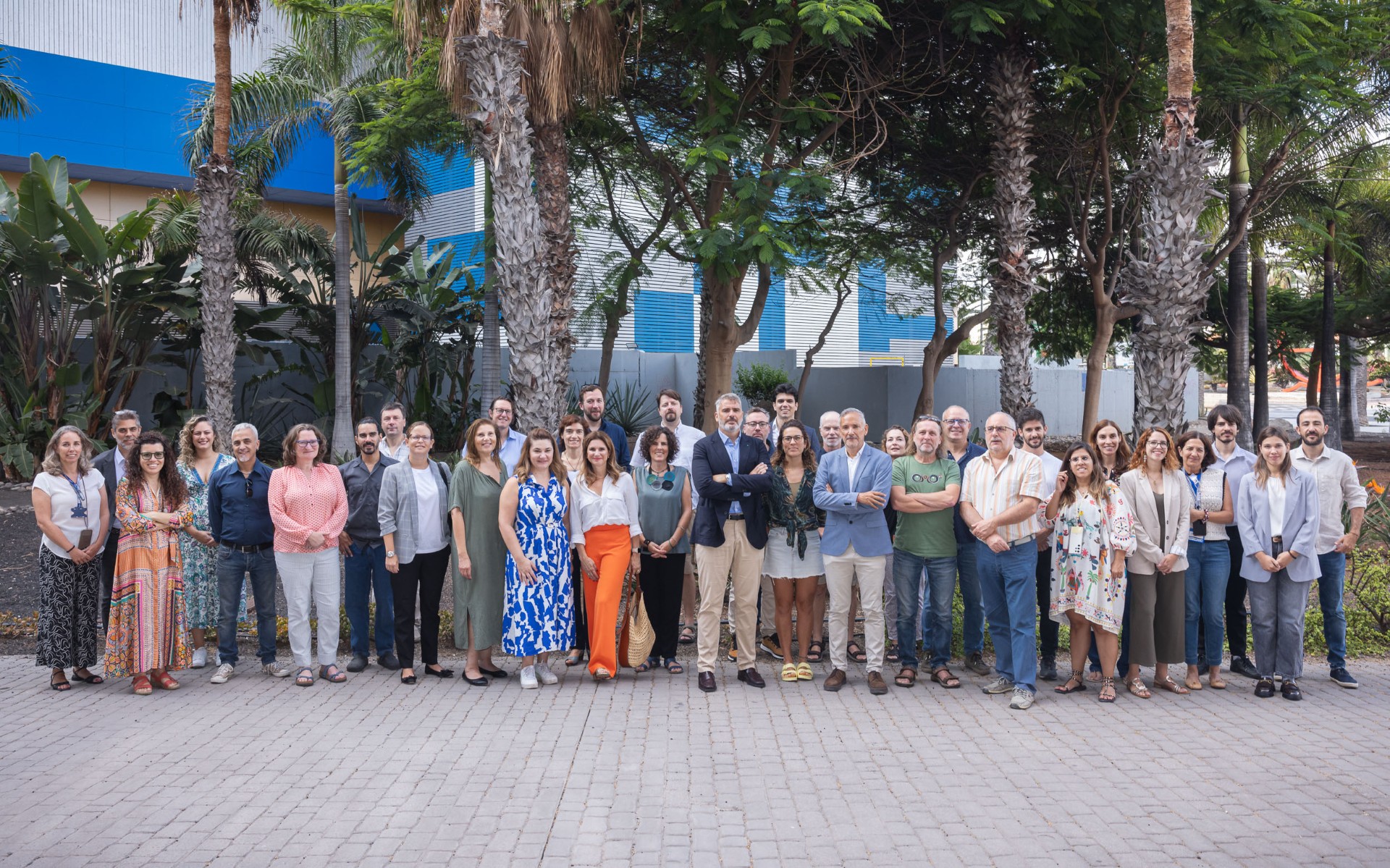The ECOAQUA institute of the University of Las Palmas de Gran Canaria is part of the PHAROS project consortium, coordinated by the Oceanic Platform of the Canary Islands (PLOCAN), which will provide nature-based solutions for the restoration of ecosystems, the recovery of biodiversity, the reduction of impacts, as well as to address the threats posed by climate change and human activities in the Atlantic and Arctic sea basins.
The director of the Canary Islands Agency for Research, Innovation and the Information Society of the Government of the Canary Islands (ACIISI), Javier Franco Hormiga, and the manager of PLOCAN, Carlos Medina Santana, together with a large representation of the Consortium, including Gercende Courtois de Viçose and Rafael Ginés, members of the Aquaculture Research Group (GIA) of the ECOAQUA institute, presented the project last Wednesday at the headquarters of the High Technology Marine-Maritime Incubator of the Economic Promotion Society of Gran Canaria.
Javier Franco Hormiga stressed that the PHAROS project is a ‘demonstration of the commitment of the Government of the Canary Islands to the restoration of marine ecosystems and the fight against climate change. The ACIISI supports this initiative which, in addition to contributing to the protection of the environment, offers us a great opportunity to develop a sustainable blue economy beyond our islands’.
Carlos Medina pointed out that ‘we are leading PHAROS because we are in a key position to integrate research, technology and international collaboration with high expectations of impact on the restoration and sustainability of marine ecosystems. The consortium offers us a diverse mix of expertise and resources ranging from cutting-edge research to applied technological innovation; and the opportunity to interconnect our test beds provides a unique platform to accelerate the implementation of solutions that benefit the oceans and the blue economy in multiple European contexts'.
The PHAROS project, with European funding support of close to €9.5 million, is aligned with the EU Ocean Mission's objective of protecting and restoring marine ecosystems and biodiversity; preventing and eliminating pollution; and achieving a sustainable carbon-neutral and circular blue economy by 2030.
More than 20 scientific centres participate in the project
Twenty-four scientific and research institutions from Spain, Portugal, Ireland, Belgium, Italy, Iceland, Denmark, the Netherlands, France, Greece, Ukraine and Norway, coordinated by Dr. Gordon Dalton of PLOCAN, participate in the five-year PHAROS Consortium of entities.

The EU missions are a new way to bring concrete solutions to current challenges such as climate change adaptation; cancer; ocean and water restoration; the development of 100 climate neutral and smart cities; and the implementation of a territorial pact for Europe by 2030. These missions represent ambitious targets and will deliver concrete results by 2030.
PHAROS will conduct trials in several areas of the Atlantic: in Gran Canaria, on the PLOCAN test bed, on the west coast of Ireland and in Iceland. At each of these sites, multiple conservation, impact reduction and restoration measures will be piloted to enhance biodiversity and develop sustainable aquaculture activities. Further trials are also being considered in Greenland and in the French overseas territories in the Caribbean.
In addition, the potentially lucrative blue economy outcomes of such nature-based solutions will be assessed, such as polyculture of macroalgae with combined reefs for biodiversity restoration; combining macroalgae and invertebrates with aquaculture cages to encourage multi-species co-production and circular nutrient use; reducing invasive species and monitoring with electronic DNA identification; and reducing pollution from abandoned, lost or discarded fishing gear (ALDFG).
The project also includes the training of entrepreneurs who carry out a business model linked to the project's actions; the expansion of the Blue Schools Network in the Atlantic and Arctic Basin; and providing active support to the European Digital Ocean Twin (EU DTO).
PHAROS is a HORIZON-MISS-2023-OCEAN-01-03 project, based on three key pillars: public mobilisation, leadership in innovation and technology, and valorisation and commercialisation for the Blue Economy. PHAROS is structured from the partnership and scaling up of the most relevant, innovative and replicable projects under the H2020 Mission, Horizon Europe and Blue Planet calls to reach all EU Atlantic Overseas Islands as well as the Arctic.
The members of the PHAROS Consortium are the following: the Oceanic Platform of the Canary Islands, the Canary Islands Agency for Research, Innovation and Information Society, the Spanish National Research Council, the Maritime Cluster of the Canary Islands, the Euro-Mediterranean Centre on Climate Change, the University of Las Palmas de Gran Canaria through the ECOAQUA institute and the Spanish Algae Bank (BEA), the University of Ghent, Underwater Gardens, EnerOcean, the Interdisciplinary Centre for Marine and Environmental Research, Bantry Marine Research Station, RORUM, the Danish University of Technology, Deltares, Blue Oasis, the International Consortium of Research Staff Associations, IFREMER, Government of the Canary Islands, Munster University of Technology, the Royal Belgian Institute of Natural Sciences, ImpactHub, the National Polytechnic University of Lviv, the Institute of Zoology Schmalhausen, the National Academy of Sciences, NORCE and Gravity Wave.


